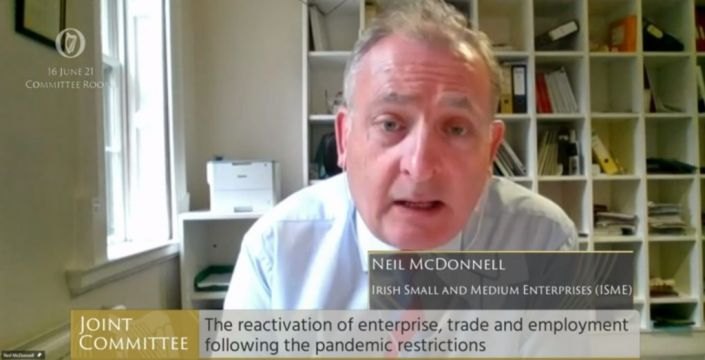The head of a major employer group has been accused of failing to provide any evidence of claims that workers are disincentivised to go back to work due to the Pandemic Unemployment Payment (PUP).
Neil McDonnell, chief executive of Irish Small and Medium Enterprises (ISME), claimed employers are experiencing difficulties in getting staff because of enhanced Covid-19 welfare payments.
Mr McDonnell told the Oireachtas Enterprise Committee that the tapering of the PUP should be accelerated.
However, Sinn Féin TD Louise O’Reilly said that more than 400,000 recipients of the PUP returned to work last year.

“All of the evidence suggests that the opposite of your claims is the case,” Ms O’Reilly added.
Mr McDonnell said the PUP was acting as a “significant brake” on the return to work in many areas of the economy such as agriculture, hospitality, grooming and accommodation.
“It should be tapered more rapidly,” he added.
“Significant disincentives persist against employees returning to the workforce in the €18,000-€30,000 income bands.”
Ms O’Reilly rejected the claims, saying all of the available evidence and claims by business people suggest “there isn’t an issue”.
“To me, it seems simple, pay your workers well and treat them decently and you are not going to have the problem you claim is there,” she added.
“The only evidence you have is anecdotal evidence.”
Mr McDonnell told the committee that particular sectors that are affected include agriculture, catering and hospitality.
“It’s a particular issue in areas where it isn’t full-time work on offer, where it’s typically part-time work,” he added.
However, Ms O’Reilly said she “didn’t accept” it was an issue in the way Mr McDonnell had characterised it.
“You haven’t provided any evidence and you are referring to sectors that are not yet fully opened,” Ms O’Reilly added.
“All evidence shows that people will go back to work when it is offered.”
Mr McDonnell said it was a particular problem in the harvesting sector, claiming that employers cannot get staff over the age of 18.
“Nobody on the PUP is applying for those jobs,” he added.
Dr Laura Bambrick, social policy officer at the Irish Congress of Trade Unions, said she does not dispute that there are a small number of employers that are struggling to find workers as they reopen.
“What we are calling into question is the basis claim that this is caused by the PUP,” Dr Bambrick said.
“We are also calling into question how the unusual is being presented as representative.
“It’s not the PUP that is causing these struggles to finding staff, so what is it?
“In hospitality, in beauty services and in agricultural there is also evidence they are struggling to get workers.
“They are finding that these sectors are disproportionately relying on cheap migrant labour and a lot of those workers have returned to their own country. They have also found that people are changing sectors and jobs that can provide regular hours and pay.
“There are some difficulties in rehiring, Ireland is not unusual in this but this is being misdiagnosed as a problem with the PUP.”
Solidarity People Before Profit’s Paul Murphy also disputed the claims, stating that it was an admission by some SMEs that they pay “poverty level wages”.
“If you want to get people back to work, should you be paying people a decent level of income that is over €350 a week, and thereby people would be incentivised to go to work as they will get a better standard of living,” Mr Murphy said.
The Government confirmed earlier this month that the PUP will be phased out from September under its National Economic Recovery Plan.
The PUP will continue until early September, then will be cut by €50 a week over three phases.
Mr McDonnell also claimed there is “a disgraceful lack of clarity” over the rights of employers and employees to know the vaccination status of co-workers returning to the workplace.
“This is unacceptable, and must be addressed before a minority of cynical members of the legal profession attempt to exploit it,” Mr McDonnell told the committee.
“GDPR is not an impediment to ascertaining the vaccination status of a returning employee.”







